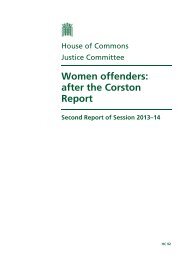Minority voices: Research into the access and acceptability of ... - MMC
Minority voices: Research into the access and acceptability of ... - MMC
Minority voices: Research into the access and acceptability of ... - MMC
- No tags were found...
Create successful ePaper yourself
Turn your PDF publications into a flip-book with our unique Google optimized e-Paper software.
<strong>and</strong> some minority groups have poorer quality housing. Poor wages, long working hours,overcrowding <strong>and</strong> bad housing all increase health risk <strong>and</strong> have an impact on children’spsychological development. 70 <strong>Research</strong> has shown that families living in poverty make less use<strong>of</strong> health services, particularly preventative services, <strong>and</strong> have poorer health <strong>and</strong> socialoutcomes. 71 The 2001 Census revealed that households headed by an ethnic minority personhad a lower disposable income than households headed by ‘White’ groups.Language barriersVarious studies have highlighted <strong>the</strong> potential problems posed by language. One study <strong>of</strong> casenotes held by a child psychiatry team found that although <strong>the</strong> clinical team was aware <strong>of</strong> <strong>the</strong>potential for communicational difficulties, efforts to overcome such problems were not <strong>of</strong>tenmentioned in case notes. 72The qualitative part <strong>of</strong> <strong>the</strong> EMPIRIC study found that in GP consultations not conducted in <strong>the</strong>patient’s first language, <strong>the</strong> level <strong>of</strong> participation by <strong>the</strong> patient was reduced, <strong>and</strong> that all <strong>the</strong>South Asian respondents who reported <strong>access</strong>ing counselling or <strong>the</strong>rapeutic services were ableto speak English. 73RacismMany <strong>of</strong> <strong>the</strong> experiences <strong>of</strong> minority populations may be characterised by discrimination <strong>and</strong>disadvantage that is likely to have a bearing on <strong>the</strong> mental health <strong>of</strong> <strong>the</strong>se individuals. Racismis a factor that contributes to mental health difficulties in adults <strong>and</strong> children. A recent studyfrom <strong>the</strong> United Kingdom showed that victims <strong>of</strong> discrimination were more likely to haverespiratory illness, hypertension, anxiety, depression <strong>and</strong> psychosis. 74 People have spoken <strong>of</strong>how ‘tiring’ it is to cope with racism - in h<strong>and</strong>ling <strong>the</strong> situation itself <strong>and</strong> in coping with its‘internal’ (or personal) consequences <strong>and</strong> moving on. 75Racial stereotyping occurs on many levels <strong>and</strong> concerns about racism in Britain’s mental healthservices are not new. 76 For example, one study found that psychiatrists were more likely toask Black patients whe<strong>the</strong>r <strong>the</strong>y had a social worker or had received learning support atschool, whereas <strong>the</strong>y were more likely to ask White patients about problem drinking. 77However it is institutional racism that has a greater impact in generating inequalities in mentalhealth services, with <strong>the</strong> report Inside Outside 78 defining this as:“a feature <strong>of</strong> institutions where <strong>the</strong>re are pervasive racist attitudes <strong>and</strong> practices, assumptionsbased on racial differences, practices <strong>and</strong> procedure which are discriminatory in outcome, ifnot in intent, <strong>and</strong> a tolerance or acceptance <strong>of</strong> such differences.”StigmaWhilst it has been suggested that <strong>the</strong>re is no evidence that majority White groups find mentalillness <strong>and</strong> mental health support less stigmatising, a number <strong>of</strong> studies have highlighted <strong>the</strong>variations in views towards stigma amongst different cultures. For example, based on somesmall local studies, some researchers have described Chinese societies as shame-orientated, 79liable to adapt <strong>the</strong>ir behaviour, particularly care-seeking behaviour, in order to ‘save face’.This may mean that Chinese are very reluctant to seek help outside <strong>the</strong> family <strong>and</strong> are fearful<strong>of</strong> criticism <strong>and</strong> stigma <strong>and</strong> <strong>of</strong> ‘losing face’ in <strong>the</strong>ir society. There may also be conflict between<strong>the</strong> service user <strong>and</strong> <strong>the</strong> family. 80Identification <strong>of</strong> mental health needs<strong>Research</strong> in several inner-city GP surgeries shows that Black <strong>and</strong> minority ethnic patients areless likely to have psychological problems identified. It is well known that both Asian <strong>and</strong>Caribbean populations do not consult <strong>the</strong>ir GPs for mental disorders. Some researcherssuggest that this may be due to <strong>the</strong> nature <strong>of</strong> GP-patient interaction <strong>and</strong> poorcommunication. 81 O<strong>the</strong>r reasons may include greater somatisation/presentation <strong>of</strong> physicalillness to GPs in patients from some Black <strong>and</strong> minority ethnic groups. 82 Inside Outsidementions fear <strong>of</strong> misdiagnosis <strong>and</strong> a lack <strong>of</strong> trust in services/pr<strong>of</strong>essionals as possible reasonsfor some groups not consulting. 83 And some studies have drawn attention to <strong>the</strong> limited time<strong>Minority</strong> Voices <strong>Research</strong> Report14
















